Over two-thirds (68%) of Netimperative readers believe remaining in the EU will be better for the UK and its digital industry, according to our reader survey published today.
Tomorrow the UK will make the biggest political decision of its life, and one that will impact us for a generation or more. With less than a day until the polls open for the UK’s historic vote on its EU membership, Netimperatve’s readers have given the pulse of the marketing industry, based on the impact a vote to leave will have on the country’s digital sector.
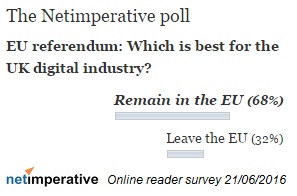
The clear majority (68%) felt that remaining in the EU will have the most positive effect on the UK’s digital marketing sector, with less than a third (32%) believing that withdrawing from the EU would be the best option.
Reasons they cite were:
• A bigger export opportunity because of frictionless trade within the EU
• A bigger growth opportunity (particularly among the start-ups)
• A bigger pool of talent
• Confidence in the future
• Stronger opportunities for trading with the rest of the world because of the added muscle the EU brings to the global table for tax and tarrif negotiations
To share their thinking, Netimperative has compiled 10 key reasons why remaining in the EU is the best option for the UK’s digital and marketing sectors.
1. As big as China and the USA: A golden opportunity for UK sellers large and small
For ecommerce companies looking to grow, the EU market is a huge. Mainland Europe has 342 million internet users. This means that UK online retailers have a chance to scale in a market which is comparable to the USA and China.
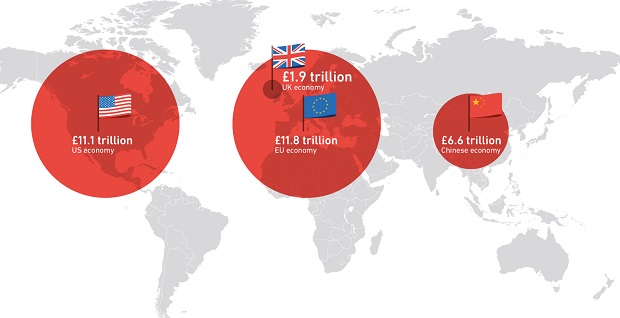
Britain already does well in Europe. The EU is Britain’s largest trading partner, with over 51% of British exports currently destined for its European partners. Britain’s media and marketing industry has always been a world leader, and being inside the EU gives preferential access to those markets. Digital production agencies, media agencies, creative shops and start-ups are all big winners.
There are also big risks if the UK leaves. Many multinationals set up their European headquarters in London, and the UK marketing industry disproportionately benefits from this. There is a multiplier effect on jobs, whereby for each client-side marketer there are several agency team partners. If the UK leaves then multinationals will be pressured by their shareholders to relocate, and to do that within the Eurozone as well as within the EU. People we spoke with echoed that a vote Leave “will be great for the Netherlands and Ireland, and not so great for Great Britain”.
The money the UK puts into the EU budget totals around £9bn a year, but is returned many times over in the form of tariff free trade on its £230bn imports and investments from overseas companies. For every pound put into the EU the UK is calculated to get nearly £10 back in trade and investment.
For perspective, this chart from 2014 shows how an average UK citizen’s tax money is spent, and how tiny the EU contribution is when compared to the UK’s spending on defense, pensions, welfare, health and even the UK’s own government administration.
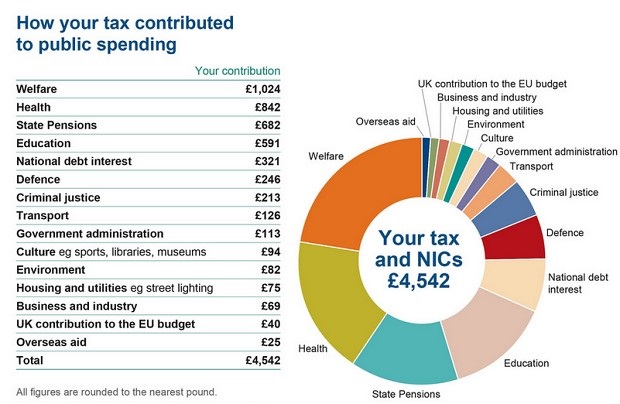
Source: Daily Telegraph
2. It’s not just about EU trade: Global trade deals will cover 88% of world
If all the current EU trade talks are completed, then the UK would have favourable trade deals with 88% of the globe. The EU gives trading muscle to all its members which is why countries like the UK and Germany can leverage agreements with the likes of the USA and China.
Recent deals with Canada and South Korea have already saved billions in tariffs and admin costs for UK firms, because they can import and export with lower rates of tax and bureaucracy than if any one country had to “go it alone”. The South Korea deal alone saves EU businesses £1.1bn annually. In the year following that deal, UK goods exports to South Korea grew by more than half, hitting their highest level ever to reach £6.3bn.
A Brexit would put the UK back to square one. It’s true that small countries can forge deals with the likes of China, but they are massively skewed in favour of the bigger partner, and a go-it-alone Britain would be going to the back of a long queue to create that. For example, the Switzerland-China trade deal gives China immediate access to Swiss markets but Switzerland has to wait 15 years for access to Chinese markets. Under the EU – in an economy bigger than China – the UK already forges much stronger import and export terms for its people and businesses. That’s what the digital industry is telling us.
3. Tech talent drain: Arbitrary immigration caps stifle growth
For talent recruitment and retention a “leave” looks bleak. Everyone in our industry knows how hard it is to find good people, and as a country we can’t train enough to fill the need. The economics are simple that client companies will either buy their digital services from firms off shore, or that the UK industry will plug gaps with internationally recruited staff. The industry benefits from inward migration from people who have been trained and skilled-up elsewhere.
If the UK leaves the EU, artificial controls to cut net migration to below 100,000 (as promised by leading Leave campaigner Michael Gove http://www.bbc.co.uk/news/uk-politics-eu-referendum-36454908) would certainly mean less digital talent coming to UK from both EU and non-EU countries. There is already a massive skills shortage in the UK digital sector and a booming economy goes hand-in-hand with high net migration. EU migrants are a net contributor to the UK.
It would also have key knock-on effects. Some agencies and tech vendors will have to outsource more. Some clients will switch to vendors that have the talent (which will see EU countries accelerate the growth of that talent as labour returns to their markets). The talent halo the UK enjoys will gradually fade, as it will no longer be the best place to work in Europe in digital.
And that’s ignoring the questionable economics of the Leave campaign as EU immigrant labour seems to be responsible for putting in £20bn more a year to the country’s wealth than they take out in public services and benefits. In a campaign that has been marked by negativity, surely any failure to reinvest this money into public services, housing and infrastructure to cope with population growth lies with the UK government, not the EU.
4. ‘Four years’ of uncertainty could hamper ambition
The long term results of a leave vote may look depressing, but the short term situation will be tough. Falling stock values and investor confidence, fluctuating exchange rates, contract reviews for big service providers. Even the Leave campaign has said to expect a rough ride and at least four years of negotiations with the EU. Their goal is that we stay in the Single Market, and for which we would still have to pay a sizable membership fee, follow most of the regulations and accept most of the free movement they have been fighting against. Their alternative is that we go it alone under World Trade Organisation rules that put additional costs on all imports from our largest markets. All this will create an atmosphere of massive uncertainty, unlike anything our generation has seen. It will leave start-ups and corporates guessing how new UK trade, employment and immigration laws will affect their own operations, and unable to plan and invest. The laws could also negatively affect the opportunities of a million UK workers currently in the EU.
Either way, the EU will be bargaining from a position of strength, as the UK has more to lose:
• UK exports to the EU are 12% of its total GDP
• EU exports to Britain are 3% of its total GDP
Source: FullFact
In the poker game of trade deals the EU negotiators will also know the UK will be under huge time constraints to get a deal signed, while EU countries can continue trading with one another as normal – giving them a stronger bargaining position.
And most ironically of all, it will be in the EU’s interest to ensure the UK gets the least favorable deal possible. Why give someone access to all the club’s facilities if they don’t pay the membership fee, and stormed out in a triumphant rally of chaos? Any pressure from net exporters to the UK, such as the German car industry will be quickly drowned out, as they represent a tiny part of an economy of 27 other EU countries, all with a vested interest that no other countries are tempted to follow suit.
5. Digital Single Market- frictionless trading from Manchester to Milan
The UK already wins in trade in the EU, and the benefits are timetabled to get bigger. The EU’s upcoming Digital Single Market could increase GDP across the EU by £300bn a year through a ‘harmonised market’ for online goods and services, from VAT charges to delivery costs. This will help the UK’s ecommerce market which has been a global pioneer. The deal aims to “tear down regulatory walls” and “enable cross-border ecommerce to flourish”. The DSM will make it easier for consumers to buy and platforms to sell things, right across the continent. It aims to make cross border e-commerce easier, shipping more efficient, simplify VAT and provide a more up-to-date framework that is fairer across Europe. All online consumers can be treated the same, whether they are in Dudley or Dusseldorf.
Once the Digital Single Market comes into being, EU online retailers will be operating in a larger, frictionless market. If you’re in the EU, the initiative will make it less complicated to create, sell, buy, deliver and scale. It’s a massive boost for the competitiveness of ecom firms, and the UK having the largest share of online retail revenue in any country will be a net winner. Companies across the EU will be operating in an internet-savvy, geographically close and culturally similar market. But in the event the UK leaves the club, then while they are winning, a post-Brexit government will be faced with renegotiating access, with UK tech companies are missing out on the opportunity to sell and scale.
6. Distribution and travel costs: Norwegian customs delays and Swiss taxes indicate UK’s future?
Buying things will get pricier, selling will get messier. Distribution costs will take a hit on the event of Brexit. The report “Delivering Brexit: The True Cost of Leaving the EU” by ParcelHero found that a typical £150 purchase from the EU would cost Brits around £195 after – that’s an increase of £45 or 30%. They provided a reasoned argument based on highly likely outcomes.. There could also be an average 5%-9% added to the price of an item in duties, and VAT of around 20% to pay (only reclaimable for those who are VAT registered because the inter-EU tax relief system would no longer be there). Additionally, it explains why there will be increased transport costs, as the UK becomes a less competitive market for international couriers, and new ‘customs clearance’ charges from global carriers: typically around £15 per shipment.
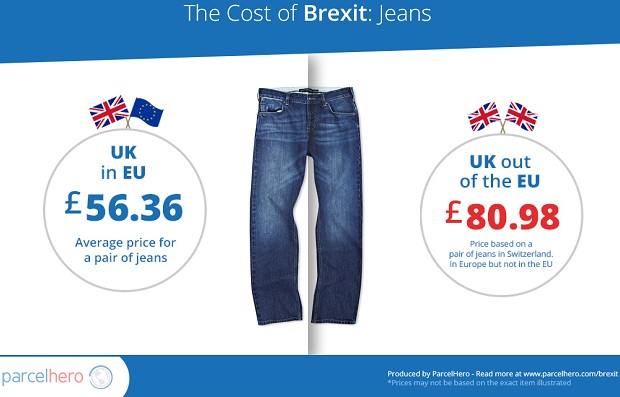
Meanwhile travel costs are also forecast to rise. Eurostar chief executive Nicolas Petrovic told Sky News that Brexit could spell extra costs and uncertainty for the train operator, saying “the growth we have been enjoyed these past years would be diminished.” Low-cost airlines have also thrived due to treaties which ensure a single aviation area across Europe. EasyJet claims that has allowed routes across Europe to almost double, and fares to fall by 40%.
7. Data protection from snoopers via Privacy Shield
Many of the benefits of the EU have been lost in the emotive noise of the last six months. Since Edward Snowden’s data spying revelations, online privacy and consumer rights have become a much more public debate, fuelled by insights about proven abuses of trust. The EU has worked to protect consumer rights, often at loggerheads with the UK government, but the result is one we all benefit from. It’s why our contracts and rights are much stronger than for citizens in the US, China, Brazil and many other world powers.
For data protection, EU watchdogs have demanded revisions to a consumer data sharing deal with the US, intended to be a replacement for the long-running ‘Safe Harbour’ pact between the two regions. The EU regulators are concerned about allegations the US authorities are spying on data held in local data centres. The EU gives a place for policymakers to collaborate and figure out the best solution for all 350m citizens. The “Article 29 Data Protection Working Party” said it was still concerned about the possibility of “massive and indiscriminate” bulk collection of EU citizens’ data by the US authorities.
8. It’s not all about London hipsters
The EU might benefit the international, cosmopolitan world of marketing, but what about other industries and regions outside London’s tech city? At Netimperative we’ve focussed on the digital media and marketing industries because as readers, you’re the audience we serve. This is a group concentrated in London, the South East, Manchester and a few other centres. Unless you look further afield it’s easy to miss all the inbound EU investments into poorer areas of the UK: hundreds of millions in infrastructure ranging from bridges to fibre – and after a Brexit there clearly won’t be funds to match that.
If Friday brings continued EU membership, then the UK digital sector will be allowed to thrive, and the UK in general will continue to benefit from EU regional policy – something that reaches way beyond those in Hoxton! 3D printing could eventually replace many shipping tasks, collaboration tools could make home working pay off, faster broadband could bridge the digital divide between the cities and rural areas. Slowly, technology is making physical limitations like location a thing of the past, and as an entrepreneurial country, the UK will get more than its fair share of the benefits.
9. The ‘Eurocrat’ paradox: A flawed democracy
A common reason for leaving is to ‘take back on control’ from faceless Brussels bureaucrats, yet it’s strange how comfortably the rhetoric can go unchallenged. When our team members have been working in Brussels, meeting the Commission staff, two things strike you. The elected officials are clear on serving their electorates and being democratically accountable, and there are a disproportionate number of British people involved in just about everything.
Would digital marketers benefit if the UK government had more control over decisions currently made in Brussels? The EU, like any other large organisation or country, will never be perfect, but nor is it the undemocratic dictatorship that the UK’s right wing press have celebrated in portraying. Some press barons seem keen to distract the public from the UK’s own issues of inequality, and the EU is a convenient scapegoat.
All EU laws can only be passed with the votes of elected MEPs, and commissioners (selected on five year rotations by our own Prime Minister and the rest of the elected European council) function in the same way as the UK’s ‘unelected’ civil servants- shaping policy ideas put forward to them. Despite what leavers say, commissioners have no powers to enforce EU laws; that responsibility relies solely on our elected MEPs. Whats more, the European Parliament has the power at any time to force the entire Commission to resign through a vote of no confidence.
In the EU parliament, the UK voted on the winning side nearly 90% of the time over the past six years, according to academics at the London School of Economics, which means the laws that the “leave” campaign are often citing are the very laws British elected officials supported.
10. Mobile roaming: a win-win for marketers and consumers, and a reminder of what a free trade area looks like
It’s one tiny illustration, but as much of the tax and trade laws are behind the scenes, this is closer to most of us. After much negotiation across all the region’s mobile operators, EU roaming charges are lower and will be scrapped next year. This is great for consumers, who can browse, shop and view online ads wherever they are in the EU, without risking the shock of a phone bill that costs more than the flight, a month later. This is also great for marketers, as more mobile use means more opportunities to target users with localised offers.
From ‘sick man’ to Superman: Brexit is Kryptonite for a thriving digital Britain
Before it joined the EU, the UK was known as the ‘sick man of Europe’. Since joining the EU, it has become an economic ‘Superman’ – and a global leader in digital innovation. But a ‘Brexit’ this Thursday could undo decades of achievement.
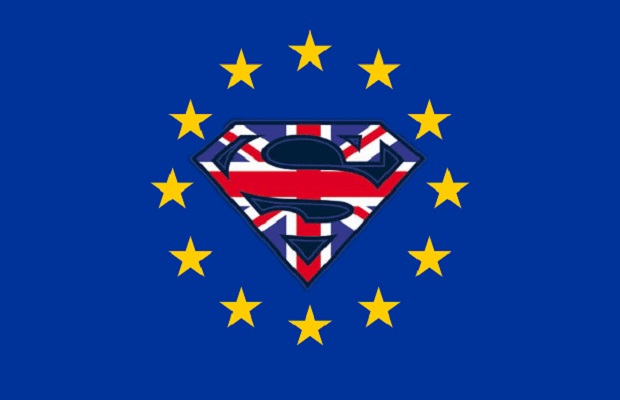
Back in in 1973, when Vint Cerf and Bob Kahn were busy inventing the internet, the UK was beset by industrial strife and poor economic performance compared to other European countries. The UK’s troubles earned it the unfortunate title of ‘sick man of Europe’ and was a key driver for it to join up trade with its neighbours via member of the EU (then known as the EEC). In the 43 years since, the UK has grown faster than Germany and the US, with a per capita GDP growth of 103%. That is more than twice as fast as in its imperial heyday before the First World War.
Was the EU solely behind this growth? Of course not. But tariff-free trade, a larger pool of international talent and an unprecedented level of co-operation with neighbouring states (rather than centuries of adversity) has helped propel the UK economy into the digital age. The UK’s unique relationships with the EU, Asia and the US has made it the perfect base for many big brands and tech start-ups alike, while its financial centre has eclipsed Wall Street to become the global capital.
Tomorrow’s historic vote will impact the UK for generations to come. Can we really risk turning our British Superman back into a sick man?
